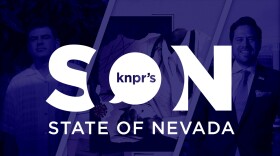Could magic mushrooms and ecstasy be coming to a psychiatrist’s office near you? They will if state lawmakers approve a bill to allow researchers to use psilocybin and MDMA to aid in therapy.
Hallucinogens have been illegal in the U.S. for decades. The Department of Justice has called LSD a drug that serves no useful purpose. That opinion might be changing. Drugs like LSD were developed in the 1930s to potentially treat depression. Now, that effort has returned in different psychedelic drugs.
Assemblyman Max Carter is a Democrat from eastern Clark County, and he co-sponsored Senate Bill 242 by state Sens. Rochelle Nguyen and Fabian Donate.
The bill would enable trials, with the goal of use by professional psychiatrists in the state of Nevada. It's been studied for years, however, and Carter said the "validity has been known for a long time."
There's also a benefit for taxpayers: "The purpose is that we don't need to be building up people's criminal records," he said. "If you talk to the police also, it's not an issue. We all know it's out there. Why are we still criminalizing this [drug] very similar to cannabis? Now we're having to clean up all of the all of these convictions in these past records for something that we now realize has therapeutic use."
Six years ago, Carter's wife fell from a horse and didn't survive. They were married for 30 years. "She was the driving force in my life and in my son's life," he said.
Following her death, he found yoga, equine therapy and other methods of mental health programs, including ketamine therapy, "which has helped resolve issues instead of just controlling the the symptoms, if that makes sense."
And there's plenty of science to back up why and how he saw relief. Rochelle and Dustin Hines are UNLV psychology professors who study the use of psychedelics with permission of the federal government.
"I think this bill is mostly targeting clinical use of psilocybin, and psilocybin is one of the substances that we have collected the most evidence for," Rochelle Hines said.
Her husband added, "we're one of a handful of labs in the country that's able to study all these psychedelics. And as neuroscientists, we're beyond excited because the questions were being able to ask are questions that were asked in our field in the '60s and '70s," he said. "How do these work? Where do they work? What happens at different doses? So really, the research right now is in our lab trying to figure out with this modern idea that I think most people will agree with, that everyone is an individual, and we have to have these individualized, personalized therapies."
The bill doesn't suggest legalizing recreational use, but a benefit of using psychedelic drugs in medical settings is the lack of dependency.
"If we look at drugs in the psychedelic class, we don't see that pattern of pathological use, where people are using at the expense of other normal things in life, like they can't go to work, because they're using psilocybin day after day after day. And so if we look at, you know, some of those measures, we don't see psychedelics causing those problems. You know, there's Alcoholics Anonymous, but there's actually not psychedelics anonymous," Rochelle Hines said.
Riana Durrett is a member of the Nevada Cannabis Compliance Board.
"Common sense changes. Anybody who views the science, anybody who has the discussion with the scientists or views the studies is pro-change. Of course, not blanket legalization, but smarter. This bill it a step forward," she said.
Guests: Max Carter, assemblyman, Nevada District 12; Dustin and Rochelle Hines, psychology professors, University of Nevada, Las Vegas; Riana Durrett, member, Nevada Cannabis Compliance Board











